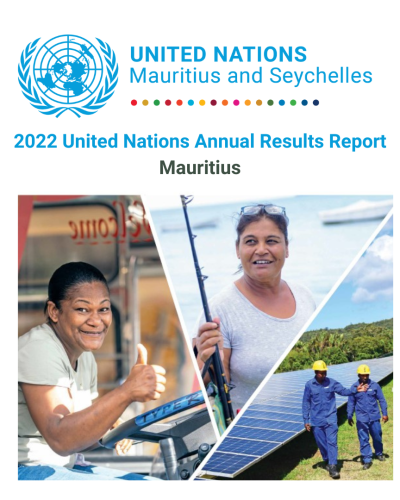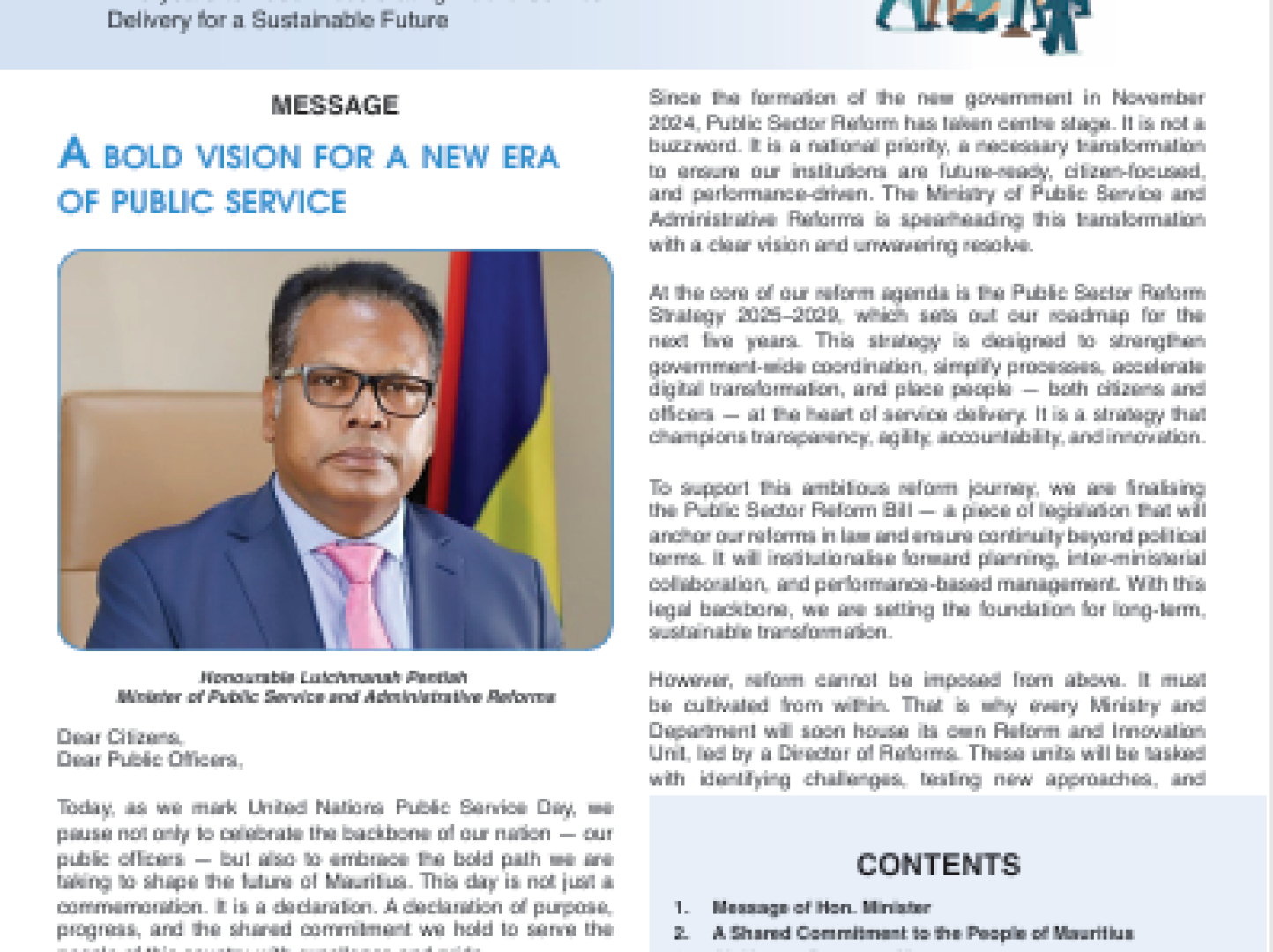2022 UN Country Annual Results Report Mauritius

The United Nations Country Team (UNCT) in Mauritius is pleased to present the Annual Results Report 2022. The report highlights progress on implementing the United Nations-Government of Mauritius Strategic Partnership Framework (SPF) 2019-2023. The SPF is aligned to national priorities, the SAMOA pathway, Africa Agenda 2063, and the Sustainable Development Goals (SDGs).
Recovery to resilience was the theme of the year for the United Nations family in Mauritius. 2022 was a year of uncertainty and mixed outcomes for the country. Post-pandemic economic recovery, driven by an acceleration in tourist arrivals, meant GDP returned to 2019 levels. On the other hand, inflation and other global disruptions overlapping with the effects of the pandemic and climate change meant further challenges to achieving Agenda 2030. As such the UNCT took a forward-looking, systems-thinking approach to enable collective efforts and greater synergies for longterm development while adapting to an ever-changing environment.
In 2022, United Nations programmes in the areas of education, health, decent work, and culture focused on institutional capacity building, policy strengthening, knowledge generation, awareness raising, and technology transfer, to address systemic challenges and contribute to improved results. For example, United Nations technical assistance was provided to ensure that the government’s Housing and Population Census adhered to international standards; develop the National AIDS Secretariat’s first annual operational plan for 2023; enhance workers' fundamental rights; and strengthen government capacity to engage Mauritian diaspora youth for national development. The year also marked the global Transforming Education Summit in response to the crisis in education. The convening power of the United Nations brought together stakeholders for national consultations, which contributed to new commitments by the government to a more resilient and responsive education system.
To bolster economic transformation the United Nations rolled out key initiatives, such as the launch of the SDG investor map to promote private capital investment. Facilitating access to appropriate and innovative technology the United Nations worked with the fishers, tea growers and small-scale farming communities to cement the resilience of food systems through sustainable agricultural practices.
Positioning the island as a safe and environmentally sustainable tourist destination, the United Nations provided technical assistance and training to Airport Mauritius and the tourism industry on protecting employees and customers against the risks posed by COVID-19. At regional level, the United Nations supported Mauritius to integrate with the other six trial countries selected to be part of the "African Continental Free Trade Area Guided Trade Initiative”, which was established so business can be conducted without being subjected to tariff barriers.
As the guardian of a large ocean space with an Exclusive Economic Zone of 2.3 million km², the issue of maritime security is vital for Mauritius. A National Action Plan was developed with support from the United Nations to combat illicit fishing, drugs, and trafficking of persons with maritime law enforcement empowered to include regional joint operations at sea.
Mauritius, as a small island state, is disproportionately vulnerable to the vagaries of climate change. Providing expertise, technical and financial assistance, United Nations agencies joined forces to identify innovative solutions to increase climate resilience. Initiatives included monitoring the blue carbon storage capacity in seagrass; small-scale reef rehabilitation; habitat restoration and attraction of seabirds to Ile aux Aigrettes; piloting the potential for seaweed fertilizer; and advancing the circular economy and waste management, to name a few.
Gender was cross-cutting. Specifically, the United Nations system provided technical assistance to the Parliamentary Gender Caucus. To support women’s economic advancement in agriculture and redress inequalities in the sector, gender training was provided to government officials. Meanwhile unskilled and unemployed women were empowered through capacity building initiatives to support education and income generation.
The United Nations family places partnership at the heart of its work. I would like to take this opportunity to thank the Government of Mauritius for the continued confidence it places in the United Nations. We appreciate the support of all our partners, including the Development Partners Group, multilateral development actors, regional cooperation bodies, international financial institutions, the private sector, civil society organizations, academia and others. I have no doubt that by continuing to engage in results-driven coordination we will make the transformative changes necessary to not only recover but also become more resilient and accelerate towards achievement of the 2030 Agenda.
As the current SPF comes to an end, we appreciate the government’s commitment taking visible ownership and active engagement in the design of the new United Nations Sustainable Development Cooperation Framework and look forward to its successful implementation from 2024.
Ms. Lisa Simrique Singh
UN Resident Coordinator for Mauritius & Seychelles




















